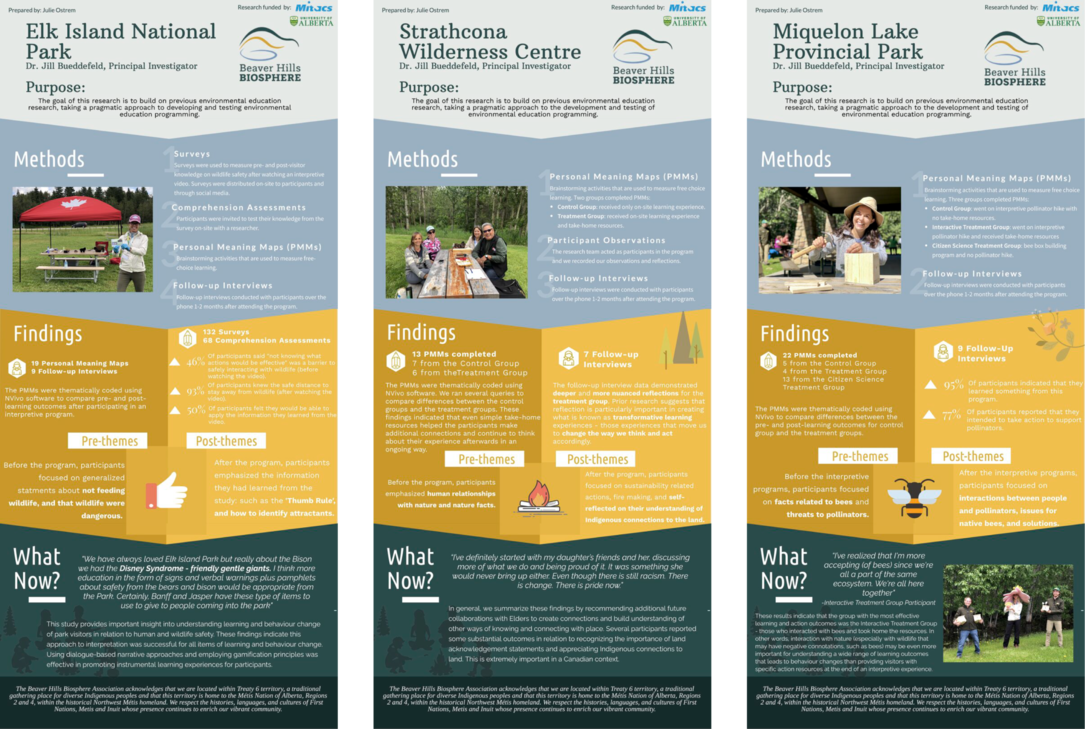Learning in Nature: Diving deeper into the nature-based experiences that motivate us

Dr. Jill Bueddefeld's post-doctoral research, Educating the Public About Environmental Issues: Environmental Action Projects in the Beaver Hills Biosphere, was finalized in early 2021. Keep reading to learn more about this applied research project that aimed to develop and test environmental education programs to determine which variables most motivated action.
Jill Bueddefeld, a Post-Doctoral Fellow at the University of Alberta, Faculty of Kinesiology, Sport and Recreation, views personal experiences as one of the most meaningful ways people can learn.
“Growing up on a small farm in southern Manitoba, I’ve always had a strong connection to nature,” offers Jill. “In my research, my goal is always pragmatic, in that I hope to find ways to help other people connect with and learn to care about nature.”
She observed this while completing her PhD in Churchill, Manitoba, witnessing people experience the stark natural beauty of the area first-hand. But during her time there she also encountered a common underlying assumption, and with it, a potential disconnect in environmental programming.
“People often assume when you visit a natural area that you will learn through osmosis, naturally understanding the environmental processes behind what you’re viewing and, with this deep understanding, become an ambassador – but we know this often doesn’t happen” explains Jill.
As Jill witnessed visitors to Churchill often missed the true meaning of an abandoned cub or changing snow levels until an interpreter explained and engaged with the visitors, she realized that was not the case.
“Unless programs are specifically tailored to have intentional outcomes, inspiring action through environmental education doesn’t automatically happen,” she shares.
In addition to the need for meaningfully intentioned programs, Jill also knew that different types of learning experiences required different types of programs. Specifically, she sought to understand how to best facilitate transformational learning[1], which inspires deep reflection and results in altered behavior.
The research project, funded with support from MITACs, aimed to better understand how environmental educators could build tailored, experience-based programs that bridge any disconnects in inspiring action.
Jill’s research methods included surveys, interpretive videos, comprehension assessments and personal meaning maps. She selected three sites within the Beaver Hills Biosphere to conduct both a treatment (where methods were tested) and controlled (no action) group.
The three sites and interpretive programs used to test the methods included Elk Island National Park’s (EINP) bison wise and bear aware program, Strathcona Wilderness Centre’s (SWC) Peoples of the Land Program and Miquelon Lake Provincial Park’s Plentiful Pollinator Hike.
Although the findings were varied, there were some notable outcomes including the results from SWC’s program, which invited Elder Bert Auger to share deep and engaging stories with visitors about his connection to the land.
Results indicated that storytelling and dialogue seemed to best enable transformational learning, enforcing that land-based learning assists people connect with nature and facilitates behavior change (essential factors in the fight against climate change).
“An important outcome of the study is when we’re evaluating or creating programs we, collectively as environmental educators, need to do a better job of promoting Indigenous learnings,” Jill explains. “We need to invite and encourage Elders and First Nations communities to teach without pushing western agendas.”
Results also showed that providing on-site activities proved to be one of the most powerful motivators to inspire action (i.e., the Miquelon Lake study provided 150 bee boxes and wildflower seed packets to visitors at Miquelon Lake Provincial Park) and finally, instrumental learning emerged as an effective strategy to address specific knowledge and behavior gaps (as seen with the EINP study).
Jill views the results as a good step for experience design and program planning, reinforcing the original hypothesis that environmental education programming can be specifically and effectively tailored, depending on the types of action desired.
This study marks the first of its kind in providing empirical evidence for tailored environmental education approaches and Jill is excited to publish the findings. In partnership with the organizations within the Biosphere who actively participated in the research, Jill will be publishing four, high-quality papers detailing the process and outcomes for each case study and site. This June, the first paper was published with the Journal of Mixed Methods Research.
Check out Dr. Jill Bueddefeld's Dr. Bueddefeld's recent projects and view the YouTube of findings from the research with the Beaver Hills Biosphere.
Learn more about the various research projects supported by the Beaver Hills Biosphere in partnership with MITACs Accelerate. Stay tuned with the Bulletin and at beaverhills.ca for more research updates.
—
[1] Transformative Learning Theory understands adult learning experiences as: “learning is understood as the process of using a prior interpretation to construe a new or revised interpretation of the meaning of one’s experience in order to guide future action.” (Mezirow, 1996)